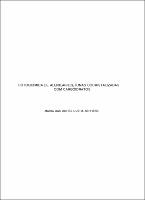Please use this identifier to cite or link to this item:
http://rima110.im.ufrrj.br:8080/jspui/handle/20.500.14407/14670| Tipo do documento: | Dissertação |
| Title: | Fotoquimica de alquilarilcetonas cocristalizadas com carboidratos |
| Authors: | Behrens, Maria das Dores Dutra |
| Orientador(a): | Ferreira, José Carlos Netto |
| Primeiro membro da banca: | Tostes, José Glauco R. |
| Segundo membro da banca: | Ferreira, Aurélio B. B. |
| Terceiro membro da banca: | Ferreira, José Carlos Netto |
| Quarto membro da banca: | Rumjanek, Victor M. |
| Keywords: | Química Orgânica |
| Área(s) do CNPq: | Química |
| Idioma: | por |
| Issue Date: | 10-Jun-1991 |
| Publisher: | Universidade Federal Rural do Rio de Janeiro |
| Sigla da instituição: | UFRRJ |
| Departamento: | Instituto de Ciências Exatas |
| Programa: | Programa de Pós-Graduação em Química |
| Citation: | BEHRENS, Maria das Dores Dutra. Fotoquimica de alquilarilcetonas cocristalizadas com carboidratos. 1991. 178 f. Dissertação (Mestrado em Química) - Instituto de Ciências Exatas, Universidade Federal Rural do Rio de Janeiro, Seropédica-RJ, 1991. |
| Abstract: | α,α -Dimetilvalerofenona (1) produz, por irradiação no ultravioleta, isobutirofenona (2) e cis- (cis-3) e trans-2,2, 4-trimetil-1-fenilciclobutanol (trans3), como produtos da reação Tipo II de Norrish, bem como benzaldeído (4) e uma mistura de olefinas como produtos da reação Tipo I de Norrish, com a razão de produtos sendo dependente da polaridade do solvente (2,3±0,3 em benzeno e 8,7±2,0 em t-butanol). A irradiação de 1 complexada com celulose microcristalina levou a uma diminuição na razão Tipo lI/Tipo I (1,0±0,1), o que pode ser explicado pelo encapsulamento de 1 entre as cadeias celulosidicas, o qual suprime, em alguma extensão, o movimento rotacional da cadeia alquílica de 1 no seu estado excitado triplete, dificultando assim a abstração intramolecular de hidrogênio γ. O encapsulamento de 1 em celulose é também importante quando se examina a razão ciclização/eliminação (C/E) para os produtos resultantes da reação Tipo II de Norrish, Assim, para benzeno e t-butanol, os valores encontrados para a razão C/E foram de 17,9±2,7 e 3,2±0,2, respectivamente. Em celulose, entretanto, obteve-se para esta razão o valor de 1,2±0,3. Quando complexos de 1 com celulose microcristalina são preparados utilizando-se um solvente que não tenha capacidade de embeber celulose (isto é, 1 irá se situar na superfície do carboidrato) tanto a razão Tipo ll/Tipo I quanto a C/E são modificadas drasticamente, tendo sido obtidos então os valores de 29,5 e 113,3, respectivamente. Isto demonstra, de maneira inequívoca, a diferença de comportamento fotoquímico para 1 quando complexada com celulose microcristalina ou simplesmente adsorvida em sua superfície. |
| Abstract: | The photolysis of α,α-dimethylvalerophenone (1) in the ultraviolet results in the formation of isobutirophenone (2) and cis- (cis-3) and trans-2,2,4-trimethyl-1-phenylcyclobutanol (trans-3) by a Norrish type II reaction, as well as benzaldehyde (4) and a mixture of olefins as products of a Norrish type I reaction. The ratío of the products was found to be dependent upon the polarity of the solvent (2,3±0,3 in benzene and 8,7±2,0 in t-butanol). The irradiation of 1 as a complex in microcrystalline cellulose resulted in a decreased ratio of type II/type I (1,0±0,1). This can be explained by the encapsulation of 1 between the cellulose molecules, resulting in the restricted movement of the alkyl chain of 1 in the triplet excited state and impeding the intramolecular abstraction of the hydrogen γ. The encapsulation of 1 in cellulose was also evident when the ratio of cyclization/elimination (C/E) for the resulting products of the Norrish type II reaction was investigated. Thus, for benzene and t-butanol, the values found for the ratio C/E were 17,9±2,7 and 3,2±0,2 respectively. However, in cellulose the value for the ratio was 1,2±0,3. When complexes of 1 with microcrystalline cellulose were prepared using a solvente incapable of swelling the cellulose (resulting in 1 being absorbed on the surface of the cellulose) both the ratios type I/type II and C/E changed drastically, and values of 29,5 and 113,3 were obtained respectively. This unequivocally shows the difference in the photochemical behaviour for 1 when complexed with microcrystalline cellulose or simply adsorbed on the surface. |
| URI: | https://rima.ufrrj.br/jspui/handle/20.500.14407/14670 |
| Appears in Collections: | Mestrado em Química |
Se for cadastrado no RIMA, poderá receber informações por email.
Se ainda não tem uma conta, cadastre-se aqui!
Files in This Item:
| File | Description | Size | Format | |
|---|---|---|---|---|
| 1991 - Maria das Dores Dutra Behrens.pdf | Maria das Dores Dutra Behrens | 2.45 MB | Adobe PDF |  View/Open |
Items in DSpace are protected by copyright, with all rights reserved, unless otherwise indicated.

